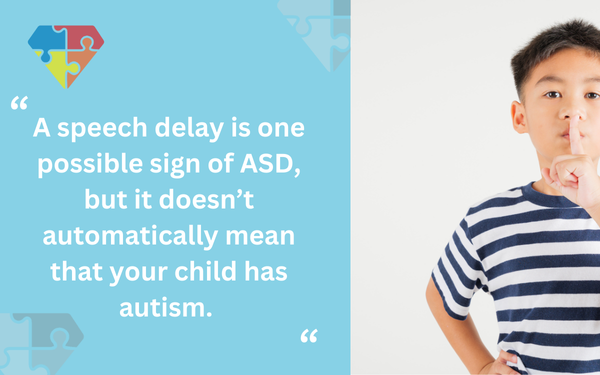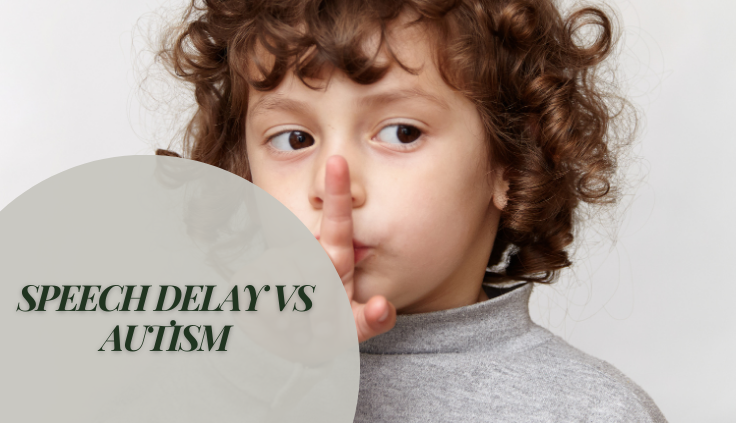Speech Delay vs Autism
All children are unique. They develop in unique ways, sitting up, crawling, taking their first steps and speaking their first words at different times.
While this is certainly true, the U.S. Centers for Disease Control and Prevention publishes a Developmental Milestones checklist that suggests what children should be able to do by different ages.
For instance, by 2 months old, the CDC says babies should be able to look at your face, smile when you talk to them or smile at them, and make sounds other than crying1. By 1 year old, babies should be able to start saying basic words, such as calling their parents mama, dada or another special name.
These developmental milestones are used by pediatricians across the country to monitor the progress children are making in their early stages of life. There are many other milestones that are integrated into screening tools such as the M-CHAT, which seeks to identify the early signs of autism and other developmental delays.
Speech is one area of particular focus for these screening tools, and for parents as well. If your child is behind on their speech development, you might wonder whether they have autism spectrum disorder (ASD).
Let’s discuss the difference between speech delays and autism to shed more light on the topic.
Learn more about whether ABA Therapy can help with speech
Table Of Contents
What Are Some of the Speech Milestones?
While a child isn’t expected to say their first words — mama, dada or something else — until they turn a year old2, the basics of speech begin long before that. In fact, babies should begin babbling between the ages of 4 and 6 months old3.
This babbling is the foundation for future speech, as they start to learn how to make noises with their mouth, how to control the volume of their voice and how their tongue and mouth work in tandem.
Some of the other speech milestones that children should be achieving include4:
- Not imitating sounds and not saying many words by 18 months old
- Not understanding basic instructions or combining multiple words together, and having less than 50 words, by 2 years old
- Not identifying body parts, using plural words and not speaking in simple sentences by 3 years old
- Not forming sentences of at least four or five words and having trouble with pronouns by 4 years old
These are some of the signs that your child may have a speech delay. Parents should pay attention to how their child’s speech is progressing as they get older, and consult with their pediatrician if they have concerns.
| Age | Speech Milestones |
|---|---|
| 4–6 months | Begins babbling |
| 12 months | Says simple words like “mama”, “dada” |
| 18 months | Imitates sounds, says several words |
| 2 years | Combines 2–4 words; understands basic instructions |
| 3 years | Forms simple sentences; identifies body parts |
| 4 years | Uses pronouns; forms sentences with 4–5 words |
Is a Speech Delay a Sign of Autism?
A speech delay is one possible sign of ASD, but it doesn’t automatically mean that your child has autism. There are other signs and symptoms that also must be present for someone to be officially diagnosed as being on the autism spectrum.

Speech delays by themselves aren’t all that uncommon. In fact, many children who experience delays in speech will see them resolve in time naturally5. Others might need specialized treatment plans to help them, including speech therapy.
Having a speech delay can certainly affect other aspects of a child’s life, but again, it doesn’t mean they have autism.
ASD is a neurodevelopmental disorder that children are born with and that affects them their entire lives. Many children on the autism spectrum face deficits with speech and communication as a whole, which is why speech delays can be so concerning to parents and professionals alike.
To be diagnosed as having autism, though, a child must also exhibit other symptoms. This includes deficits in social interaction, and having restrictive interests, repetitive behaviors and/or sensory sensitivities.
How Can You Tell Whether Your Child Has a Speech Delay or Autism?
In addition to the CDC’s Developmental Milestones checklist, your child’s pediatrician should be using other screening tools to identify some of the early signs and symptoms of ASD and other conditions.
These screening tools — which are often a combination of parental response and physician observation — will help identify whether your child might have a speech delay or could be at risk of having autism.
If autism is suspected, your child will likely be referred to a specialist such as a clinical psychologist or developmental pediatrician for a more in-depth evaluation. This is when they will be observed and evaluated more for a possible ASD diagnosis.
At this point, the professionals will be able to make a determination, and then refer your child to the specialized treatment that would be best for them.
If your child is diagnosed with autism, they will likely be referred for applied behavior analysis, or ABA therapy. This is considered the gold standard treatment option for children on the autism spectrum, as it’s a tried-and-true way to help children build the social, communication and daily life skills with which they often struggle.
| Feature | Speech Delay | Autism Spectrum Disorder (ASD) |
|---|---|---|
| Speech Development | Delayed babbling, few words | Delayed speech + difficulty with non-verbal communication |
| Social Interaction | Typically engages well | May avoid eye contact, struggle with relationships |
| Comprehension | Often understands language appropriately | May not respond to name or understand simple instructions |
| Play Behavior | Imaginative play present | May show repetitive or fixated play patterns |
| Sensory Issues | Rare | Often sensitive to lights, sounds, textures |
| Emotional Expression | Age-appropriate emotional reactions | May show flat affect or extreme reactions |
| Diagnosis & Treatment | Pediatric screening; may need speech therapy | Requires multi-disciplinary assessment; ABA therapy recommended |
Blue Gems ABA Provides Ongoing Support to Children with ASD
Speech delays can be an indicator of ASD in a child, but they alone do not determine whether a child has autism or not. Other signs and symptoms must be present for ASD to be diagnosed, which is why in-depth evaluations by trained professionals are necessary.
At Blue Gems ABA, we have a team of experienced professionals who administer ABA therapy to children on the autism spectrum. Through positive reinforcement, repetition and many other tools and strategies, we help children modify certain behaviors and build the skills they need to live happy, healthy, fulfilling, productive and independent lives.
To learn more, please contact us today.
References
- https://www.cdc.gov/ncbddd/actearly/milestones/milestones-2mo.html
- https://www.thebump.com/a/when-do-babies-say-mama-dada
- https://www.mayoclinic.org/healthy-lifestyle/infant-and-toddler-health/in-depth/infant-development/art-20048178
- https://www.stanfordchildrens.org/en/topic/default?id=age-appropriate-speech-and-language-milestones-90-P02170
- https://smalltalkpediatric.com/when-to-worry-and-when-to-wait-navigating-speech-delays/




